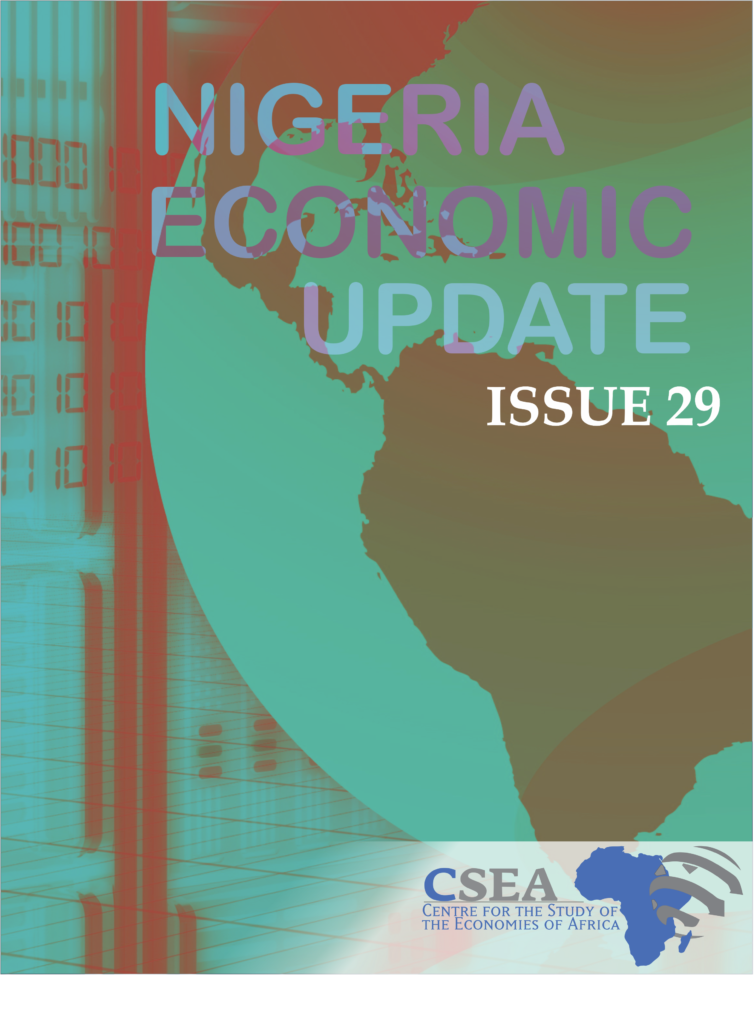The IMF retained its 2.1 percent forecast of Nigeria’s GDP growth rate for 2018, while increasing the 2019 projected GDP growth rate to 2.3 percent1, from 1.9 percent projected earlier. The stated review is at the backdrop of continued increases in commodity prices in the long term, for which crude oil is the benchmark for Nigeria. Outlook on crude oil price and production is expected to maintain upward improvements in the near term. However, the Nigerian government pegs its own forecasted growth rate at 3.5 percent in 2018 – higher than figures predicted by the IMF, although premised around the same driving factors. In order to achieve a 3.5 percent GDP growth rate, a more effective implementation of the bold initiatives in this administration’s economic plan – the Economic Recovery and Growth Plan – is critical particularly in the agriculture and manufacturing sectors.
Macroeconomic Report & Economic Updates

August 14, 2018
Nigeria Economic Update (Issue 29)
The IMF retained its 2.1 percent forecast of Nigeria’s GDP growth rate for 2018, while increasing the 2019 projected GDP growth rate to 2.3 percent1, from 1.9 percent projected earlier. The stated review is at the backdrop of continued increases in commodity prices in the long term, for which crude oil is the benchmark for […]
Read →
Related
Nigeria Economic Update (Issue 9)
Crude oil prices fluctuated during the
review week. OPEC weekly basket price decreased marginally from $53.63 on
February 24, 2017 to $53.34 on March 3, 2017. Similarly, Brent
crude declined (week-on-week) by 0.84 percent to $55.15, while
Bonny light decreased by 2.4 percent to $54.4 per barrel. During
the week, reports of Russias incomplete compliance to agreed production cut and
rising United States crude production/inventories, led to the
slight pressure exerted on oil prices. The uncertainties and volatility of
global crude oil price stresses the need for the government to channel efforts
at developing other key sectors of the economy, particularly the manufacturing
sector.
Nigeria Economic Update (Issue 13)
OPEC basket price increased (Week-on-Week) by 1.6 percent to $49.45 per barrel on March 31, 2017- the first increase recorded in three weeks. Also, Bonny light rose by 4.7 percent to $51.92 per barrel. The rise in crude oil prices reflects demand-side expansion, consequent upon a myriad of factors: slower rise in USA crude reserves, huge supply disruptions in Libya, and the prospective extension of OPEC supply cut deals in member countries. The strengthening of crude oil price amid calm in the Niger Delta oil region, presents positive outlook for the Nigerian economy. However, given the adverse implications of sole dependence on crude oil revenue, the government should avoid returning to the norm and make efforts to intensify investments in other key sectors of the economy
Nigeria Economic Update (Issue 30)
Recent media highlights suggest that there is a prospective decrease in Nigerias budgetary benchmark crude oil production. Precisely, the 1.8 million barrels per day proposed at the Joint OPEC and Non-OPEC Ministerial Monitoring Committee (JMMC) meeting, is 18.2 percent lower than the budgetary production benchmark of 2.2 million barrels per day. This followed OPECs recent review to include Nigeria in the ongoing production cut agreement amid concerns of global oil market oversupply, given the constant production increase from Nigeria over the last few months.
